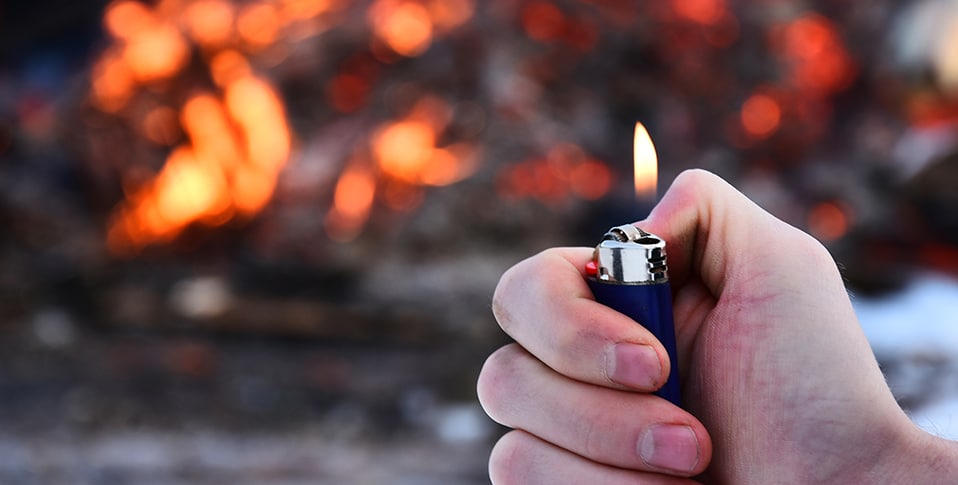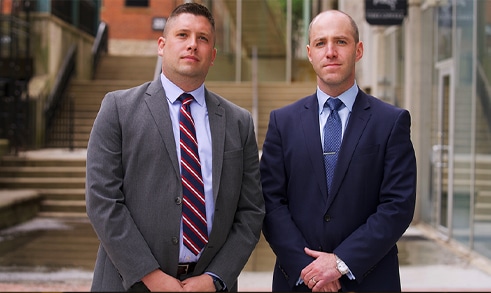
Columbus Arson Defense Lawyer
Strong advocacy for defendants charged with arson in Ohio
A conviction for arson will likely mean imprisonment for a long period of time – but only if the prosecution can prove a defendant committed the crime beyond a reasonable doubt. Usually, the government will not have witnesses who saw a defendant strike a match, ignite a fire, or create an explosion. Many arson cases require the testimony of fire professionals. Arson cases also require that the government prove the fire was set intentionally, and that there is evidence to indicate the defendant was the person who started the fire.
At Soroka & Associates, LLC, our Columbus arson defense lawyers have been fighting for criminal defendants since 2009. Our criminal defense lawyers work aggressively to show there is a reasonable doubt about the cause of the fire and a defendant’s involvement in the fire. Our lawyers assert every Constitutional, legal, and factual defense available. We work to obtain dismissals, acquittals, and plea bargains. We also work to obtain alternatives to prison time.
How can we help?

What is the statutory definition of arson?
O.R.C. 2909.03 states:
No person, by means of fire or explosion, shall knowingly do any of the following:
- Cause, or create a substantial risk of, physical harm to any property of another without the other person's consent;
- Cause, or create a substantial risk of, physical harm to any property of the offender or another, with purpose to defraud;
- Cause, or create a substantial risk of, physical harm to the statehouse or a courthouse, school building, or other building or structure that is owned or controlled by the state, any political subdivision, or any department, agency, or instrumentality of the state or a political subdivision, and that is used for public purposes;
- Cause, or create a substantial risk of, physical harm, through the offer or the acceptance of an agreement for hire or other consideration, to any property of another without the other person's consent or to any property of the offender or another with purpose to defraud;
- Cause, or create a substantial risk of, physical harm to any park, preserve, wildlands, brush-covered land, cut-over land, forest, timberland, greenlands, woods, or similar real property that is owned or controlled by another person, the state, or a political subdivision without the consent of the other person, the state, or the political subdivision;
- With purpose to defraud, cause, or create a substantial risk of, physical harm to any park, preserve, wildlands, brush-covered land, cut-over land, forest, timberland, greenlands, woods, or similar real property that is owned or controlled by the offender, another person, the state, or a political subdivision.
The statute also applies to “occupied structures,” defined as “Any house, building, outbuilding, watercraft, aircraft, railroad car, truck, trailer, tent, or other structure, vehicle, or shelter, or any portion thereof,” which is used as a permanent or temporary dwelling, regardless of whether someone is there.
The crime of arson is a felony of the third degree if a defendant knowingly, by means of a fire or explosion:
- “Causes, or creates a substantial risk of, physical harm, through the offer or the acceptance of an agreement for hire or other consideration, to any property of another without the other person's consent or to any property of the offender or another with purpose to defraud.”
- "Causes, or creates a substantial risk of, physical harm through the offer or the acceptance of an agreement for hire or other consideration, to any structure of another that is not an occupied structure.”
Otherwise, arson is a misdemeanor of the first degree with one exception. The crime of arson is a felony of the fourth degree if the value of the property or the amount of physical harm is $1,000 or more.
What is the statutory definition of aggravated arson?
Ohio defines the crime of aggravated arson as follows:
No person, by means of fire or explosion, shall knowingly do any of the following:
- Create a substantial risk of serious physical harm to any person other than the offender.
- Cause physical harm to any occupied structure.
- Create, through the offer or acceptance of an agreement for hire or other consideration, a substantial risk of physical harm to any occupied structure.
The crime of aggravated arson is a felony of the first degree if a person (other than the offender) is harmed, or the fire or explosion was based on an agreement. Otherwise, the crime of aggravated arson is a felony of the second degree.
What are the penalties for arson in Ohio?
Most felony convictions will result in imprisonment. The more serious the offense (for ex. a felony of the first degree is more serious than a felony of the second degree), the longer the prison sentence will be, and the larger the fine will be. Generally, your penalties will include:
- First-degree misdemeanor: up to 180 days in jail and/or up to $1000 in fines
- Fourth-degree felony: between six and 18 months in prison and/or up to $5,000 in fines
- Third-degree felony: between nine and 36 months in prison and/or up to $10,000 in fines
- Second-degree felony: between two and eight years in prison, and/or up to $15,000 in fines
- First-degree felony: between three and 11 years in prison, and/or up to $20,000 in fines
Note, however, that in some cases, you may face mandatory sentencing, and could conceivably be sentenced to more time in prison. It depends on your case, your criminal record, and other mitigating factors. Cases involving federal property will almost certainly lead to federal charges, and the penalties may be significantly greater.
In addition to imprisonment and fines, anyone convicted of a crime (especially a felony) will likely have difficulty finding employment, a place to live, obtaining credit, and permission to own a firearm. In arson cases, defendants may be ordered to pay restitution for the value of the damage the fire or explosion causes.
Why do people commit arson in Columbus?
Some of the motives for arson that the prosecution will seek to prove, and our Columbus arson lawyers will seek to deny, include vandalism, revenge, terrorism, concealment of other crimes, and mental illness. Another common cause is profit. The government will often look to see if a defendant sought to collect insurance proceeds if he/she owned the property, or if an arrangement was made was to destroy the property of another owner to collect the insurance proceeds.
What defenses do you assert for anyone charged with arson in Ohio?
The movies lead people to believe that there are a lot of people setting intentional, life-threatening fires. The thing about arson is that to be charged with and convicted of this crime, the state must prove that you knowingly set a fire or created an explosion. This means that a high school student who sets off a bunch of illegal fireworks at once could technically be charged with arson if one of those fireworks sparks a blaze elsewhere. College kids who build a bonfire that gets out of control can also be charged with arson.
As such, one of the first things we do is attempt to establish that there is no evidence of malicious intent. Often the government will hire fire experts who will review the way the fire occurred and many other factors to show the fire was intentional. Our Columbus arson defense lawyers understand how to question these experts and when to hire our own fire experts.
Other legal defenses include:
- Seeking to suppress any evidence that violates a defendant’s Constitutional rights. These rights include a Fourth Amendment right to be free from unreasonable searches and searches without a proper warrant, a Fifth Amendment right not to self-incriminate oneself, and a Sixth Amendment right to question the witnesses against the defendant.
- Arguing that the value of the property was below the $1,000 threshold, which should reduce the charges you face.
- Asserting innocence based on your location – AKA, proving you have an alibi for why for the date and time of the offense.
Other legal defenses may also apply depending on what happened.
In addition to asserting all your defenses, our Columbus arson defense lawyers work to negotiate plea agreements to less serious charges such as vandalism, criminal mischief, and other offenses. We also explore non-prison options especially when mental illness is a contributing factor.
Do you have an arson attorney near me?
The Columbus office of Soroka & Associates is located at 503 South Front Street, Suite 205. We’re close to I-71 and Rt. 23. We do meet with defendants in prison when necessary.
Speak with a respected Columbus arson defense lawyer today
At Soroka & Associates, our criminal defense lawyers represent defendants from the moment of an arrest through the initial hearings to the trial of the case. Many times, we can resolve the criminal charges before a jury trial. Our lawyers are admired by former clients and prosecutors for our impressive record of success in criminal defense litigation – including arson charges. Call us at 614-918-4078 or complete our contact form to schedule a free consultation.
